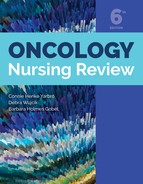F. COPING MECHANISMS AND SKILLS
36. Deterioration in communication patterns between individuals with cancer and their family is most predictable under which of the following circumstances?
- When the cancer is first diagnosed
- When the individual is reluctant to discuss prognosis
- When the professionals give most information to the patient and not the family
- When professionals give more information to the family than the patient
37. Which of the following nursing action is most effective with cancer patients experiencing anxiety?
- Helping the patient learn new coping strategies through anxiety-reducing role playing
- Helping the patient focus on the perceived threat and appraise the stimuli in a different way, thus reducing anxiety
- Helping the patient identify stimuli that have resulted in a loss of self-esteem
- Therapeutic communication and assessment
38. You are working with Mr. Jones and his family, who have just discovered not only that his lung cancer has recurred, but also that it is terminal this time. Which is likely to be true regarding the psychosocial needs of Mr. Jones and his family?
- When coping with a difficult disease like lung cancer, it is the discovery of meaning in the disease that gives one a sense of mastery.
- His family is likely to develop depressive symptoms and will need appropriate interventions.
- Often the fear of dying is not as profound as the fear of suffering in the process.
- Patients who are allowed to indulge excessively in expressing their fears, concerns, and wishes regarding death are more prone to morbid depression.
39. Which of the following statements about effective coping and healthy lifestyle behavior is true?
- Use of denial or behavior disengagement as coping strategies is associated with a poorer psychological well-being.
- Psychosocial responses to cancer can be clearly identified as either adaptive or maladaptive.
- A perception of uncertainty in a situation results in an appraisal of danger.
- Distancing behaviors of health professionals are helpful in preventing overinvolvement.
40. Which of the following statements most accurately describes the relationship between family responses to a diagnosis of cancer and the responses of patients themselves?
- Family responses are similar to patient responses.
- Responses of anxiety and depression are less common among family members than among patients.
- Responses of hopelessness and altered sexual health are less common among family members than among patients.
- Family responses generally are not similar to patient responses.
